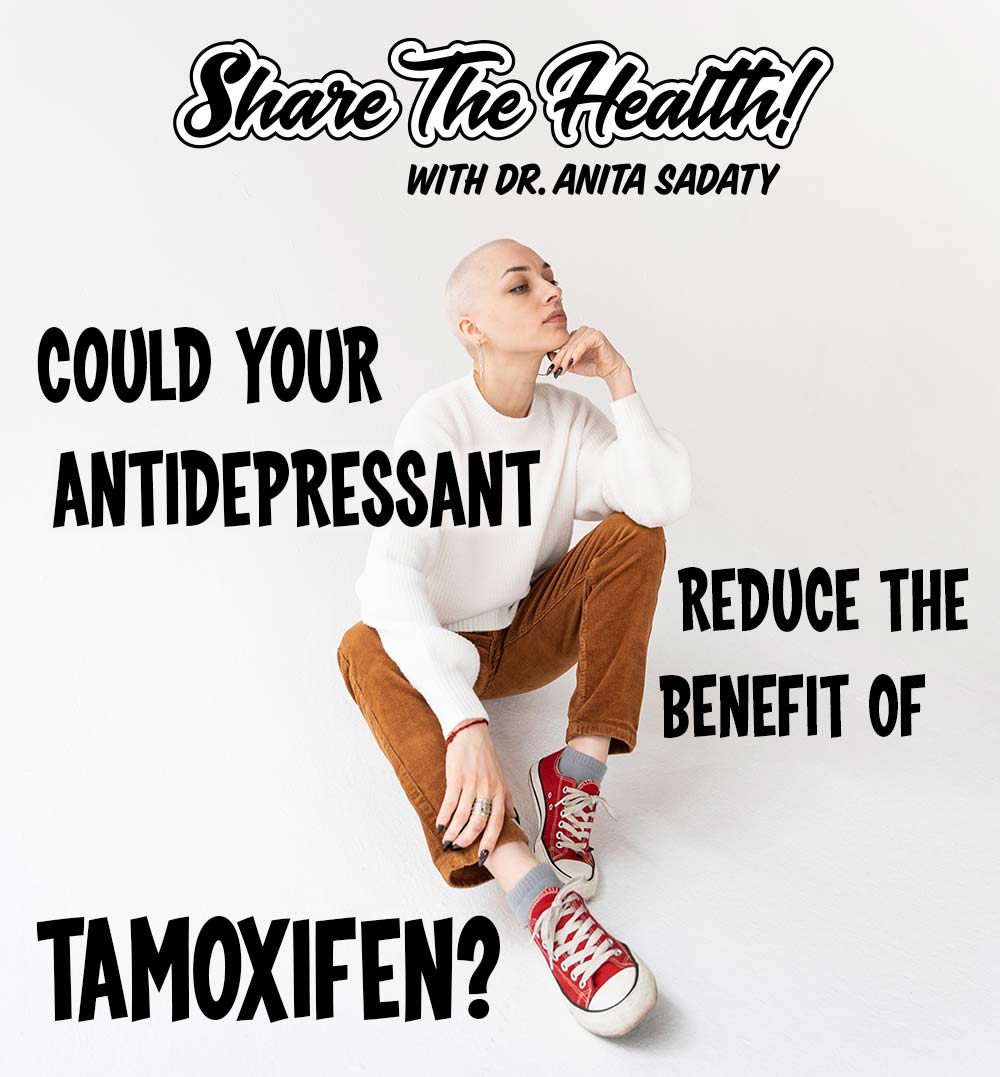
Tamoxifen
Many women in the United States take Tamoxifen as either a breast cancer treatment or for long-term prevention. These women should know if their Tamoxifen treatment is effective for them and if there are ways to improve or reduce the chances that it is doing its job. In this post, I would like to shine some light on how certain antidepressants may be blocking the benefit of the Tamoxifen and to consider alternative methodologies to help depression, while still keeping your anti-cancer treatment effective.
Consider this……
- Tamoxifen is only effective for one-half of women who take it for the recommended five years after their initial cancer treatment for early stage breast cancer, Taking it for ten years, Tamoxifen is only effective for one-third of women after their initial cancer treatment.
- Put another way: Between 30 to 50% of women will receive the breast cancer risk reduction intended from using Tamoxifen. The other 50 to 70% will not. Why is that?
- Certain drugs can interact with Tamoxifen making the treatment LESS LIKELY to BENEFIT you. Certain types of Antidepressants may affect Tamoxifen’s benefit.
- 20-30% of women use antidepressants while taking Tamoxifen.
- Your genetics in combination with antidepressant use may play a role in reducing the efficacy of Tamoxifen.
Let’s check out some science…
I never knew that Tamoxifen by itself is not responsible for its anticancer effect. Your liver uses certain enzymes to process drugs. Some drugs must be converted from an inactive form to an active form in order to work. Why thank you liver!
One of these important enzymes is known as CYP2D6. This enzyme converts Tamoxifen into its ACTIVE FORM known as ENDOXIFEN. Some women have certain genetic variants that can limit their ability to make the enzyme needed to activate the tamoxifen. In fact, 7% of women do not have this enzyme at all!
Although you can check to see if you carry the CYP2D6 enzyme variant, it is not clear that having the variant means you will not benefit from using Tamoxifen. Knowing this information however, may be important if you are also taking other medications that reduce the effectiveness of Tamoxifen in preventing breast cancer.
How can this impact the benefit of Tamoxifen?
Consider that 20-30% of women who take Tamoxifen ALSO use antidepressants. Some of these antidepressants are such strong inhibitors of the CYP2D6 enzyme that some women MAY NOT FULLY BENEFIT from taking Tamoxifen. According to two journal articles referenced below, three SSRI antidepressant medications are VERY LIKELY to inhibit CYP2D6 and block the Tamoxifen effect against breast cancer:
- Prozac (fluoxetine)
- Paxil (paroxetine)
- Wellbutrin (bupropion)
A review of seven studies of women taking SSRI antidepressants and Tamoxifen found that Paroxetine, Bupropion and Fluoxetine were strong inhibitors of CYP2D6.
Which drugs affect the CYP2D6 enzyme? Here is a list from least to most impact on blocking the CYP2D6 enzyme:
MINIMAL impact — these would be least likely to interfere with Tamoxifen effect:
- Effexor (venlafaxine)
- Pristiq (desvenlafazine)
MILD impact — (NOTE only celexa was specifically studied with Tamoxifen)
- Celexa (citalopram)
- Lexapro (escitalopram)
MODERATE impact (NOTE only sertraline was specifically studied with Tamoxifen)
- Sertraline (zoloft)
- Cymbalta (duloxetine)
- Luvox (fluvoxamine)
STRONG impact (best to avoid when taking Tamoxifen)
- Prozac (fluoxetine)
- Paxil (paroxetine)
- Wellbutrin (bupropion)

Now this may be academically interesting, but is there any evidence that this theory translates into real life?
Canadian researchers at Sunnybrook Health Sciences Center in Toronto published a study designed to see if CYP2D6 inhibition affected clinical outcomes of women taking both Tamoxifen and SSRI’s. They looked at health care records of 2,400 women aged 66 and older who took Tamoxifen, as well as a single SSRI. When the study ended, 374 women had died of breast cancer. The researchers estimated that, within five years after ending Tamoxifen treatment, one additional breast cancer death would occur for every 20 women who used Paroxetine for 40% of the time they were also taking Tamoxifen — this suggests that the risk of death increased with duration of the Paroxetine-Tamoxifen use.
Now this is a small study and we can’t draw clear conclusions from this alone. Whether or not Tamoxifen and SSRI’s are CLINICALLY RELEVANT remains controversial. Some studies have not shown consistent evidence that antidepressant use is associated with adverse outcomes in women taking Tamoxifen. Partly because the study needed to adequately address this concern is monumentally difficult to perform and has yet to be done.
Take-home points:
- Clearly, antidepressant prescribing should be guided by which medication will work best to treat depression and anxiety.
- If possible, it might be wise to avoid using antidepressants that block CYP2D6 activity as it could reduce the anti-cancer effect of Tamoxifen.
- Fluoxetine, Bupropion, and especially Paroxetine have the greatest inhibition on the CYP2D6 enzyme.
- Sertraline, citalopram, escitalopram, and venlafaxine have a lower inhibition impact and are reasonable alternatives.
- For women already taking Tamoxifen with a known CYP2D6 inhibitor, any change in treatment should be gradual to minimize the risks of SSRI withdrawal and should be done under a physician’s supervision.
- For those women unable to use an antidepressant that is less likely to interfere with Tamoxifen, there may be other anti-cancer medications that don’t rely on CYP2D6 enzymes. Examples include: Raloxifene (Evista), Anastrazole (Arimidex) and letrozole (Femara).
That does it for this episode of Share The Health. If you want to explore this topic further, check out the sources below.
Please Share the Health if you liked what you read!!!
For more information about my wellness programs and my practice, check out my website drsadaty.com. Hey Look! You are already here…
Ready for the legal disclaimer? Information offered here is for educational purposes only and does not constitute medical advice. As with any health recommendations, please contact your doctor to be sure any changes you wish to consider are safe for you!
Sources:
≻ Desmarais JE, et al. “Interactions Between Tamoxifen and Antidepressants via Cytochrome P450 2D6,” Journal of Clinical Psychiatry (Dec. 2009): Vol. 70, No. 12, pp. 1688–97.
≻ Kelly CM, et al. “Selective Serotonin Reuptake Inhibitors and Breast Cancer Mortality in Women Receiving Tamoxifen: A Population-Based Cohort Study,” BMJ (Feb. 2010): Vol. 340, electronic publication.
≻ Revisiting the drug interaction between tamoxifen and SSRI antidepressants.
≻ BMJ 2016; 354 doi: https://doi.org/10.1136/bmj.i5309 (Published 30 September 2016) BMJ 2016;354:i5309